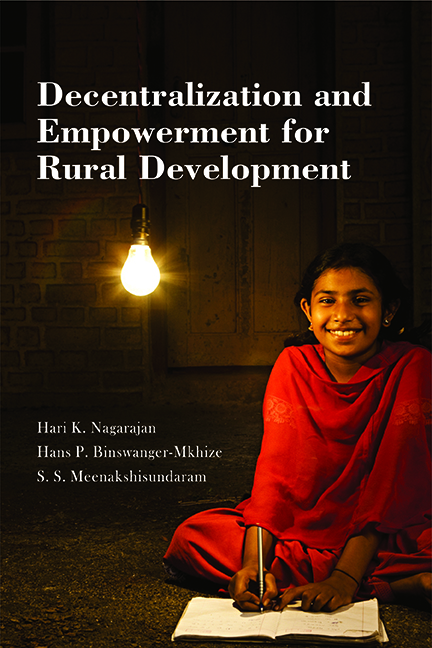Book contents
- Frontmatter
- Contents
- List of Tables and Figures
- Foreword 1
- Foreword 2
- Preface
- 1 Introduction
- 2 Decentralization: Cross-country Experiences
- 3 Thinking about Decentralization in India: 73rd Amendment and Beyond
- 4 Literature
- 5 An Overview of the Data
- 6 Analytical Approaches and Econometric Methods Used
- 7 Can Panchayats Improve the Quality of Services? Some Qualitative Evidence
- 8 Impact of Political Reservations for Women in Panchayats
- 9 Importance of Individual Empowerment of Women
- 10 Governance, Service Provision and Development Outcomes
- 11 The Impact of Fiscal Grants on Tax Efforts of Village Panchayats
- 12 Incidence of Identity-based Voting and Bribes in Panchayats
- 13 Panchayats and Household Vulnerability
- 14 Key Findings, Conclusions and Policy Recommendations
- References
- Index
- About the Authors
12 - Incidence of Identity-based Voting and Bribes in Panchayats
Published online by Cambridge University Press: 30 November 2022
- Frontmatter
- Contents
- List of Tables and Figures
- Foreword 1
- Foreword 2
- Preface
- 1 Introduction
- 2 Decentralization: Cross-country Experiences
- 3 Thinking about Decentralization in India: 73rd Amendment and Beyond
- 4 Literature
- 5 An Overview of the Data
- 6 Analytical Approaches and Econometric Methods Used
- 7 Can Panchayats Improve the Quality of Services? Some Qualitative Evidence
- 8 Impact of Political Reservations for Women in Panchayats
- 9 Importance of Individual Empowerment of Women
- 10 Governance, Service Provision and Development Outcomes
- 11 The Impact of Fiscal Grants on Tax Efforts of Village Panchayats
- 12 Incidence of Identity-based Voting and Bribes in Panchayats
- 13 Panchayats and Household Vulnerability
- 14 Key Findings, Conclusions and Policy Recommendations
- References
- Index
- About the Authors
Summary
Right wing academic force – particularly a group of sociologists and anthropologists – advised the Bharatiya Janata Party led National Democratic Alliance Government not to go for caste based census in 2001 as it would go against the ruling upper castes and communities. It is fallacious to argue that society will get further divided if the population of each caste is known to the policy maker and public…It is true that we cannot distribute everything based on caste. But caste census is the right basis for statistics such as literacy rates and issues like proportional representation. Once we cite the Census data there cannot be any authentic opposition to that evidence…In a democracy based on numbers, any section of the society can come to power. If the caste census in done, then Indian democracy would thrive on the firm support of the lower castes who keep hoping of getting their share based on their numbers – Kancha Ilaiah (an academic arguing for a caste-based census in India).
Socio-economic development can be planned for OBCs like for the SC/STs. Every group must get their due – (President of the Congress party in Tamil Nadu).
Introduction
The preceding quotes by both members of the academic community and the political party suggest that identity defined by Jati (caste) ought to define political processes and help achieve desirable development outcomes for those groups defined by such identities. From Chapter 10, it can be noted that enabling panchayats will create avenues for households to access services. Villages have social networks formed along caste identities that may fracture the ability to arrive at a consensus. Under such circumstances, will decentralization lead to identity-based voting? In fact, from chapter 3 it is learnt that the likelihood that the possibility of such behaviour by households was the reason for many of the founding members of the constitution to oppose decentralization being provided for within its ambit.
With respect to identity-based voting, Munshi and Rosenzweig (2010) have shown that it could result in group members being able to hold elected officials to account and, therefore, allow than to elect more able representatives. This section also analyses bribes, and with respect to both behaviours it goes further by analysing how identitybased voting and payments of bribes improves the access of households to public services and their consumption in the face of imperfections of the governance system.
- Type
- Chapter
- Information
- Decentralization and Empowerment for Rural Development , pp. 264 - 293Publisher: Foundation BooksPrint publication year: 2014



